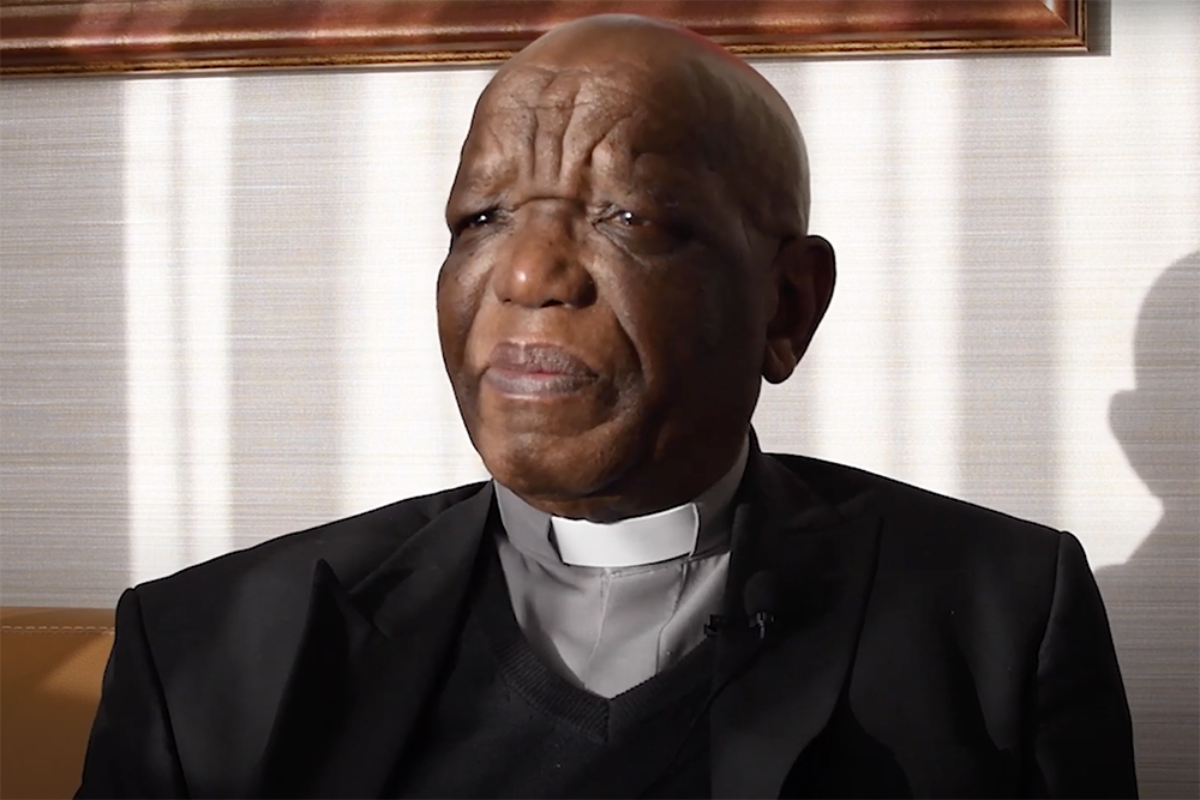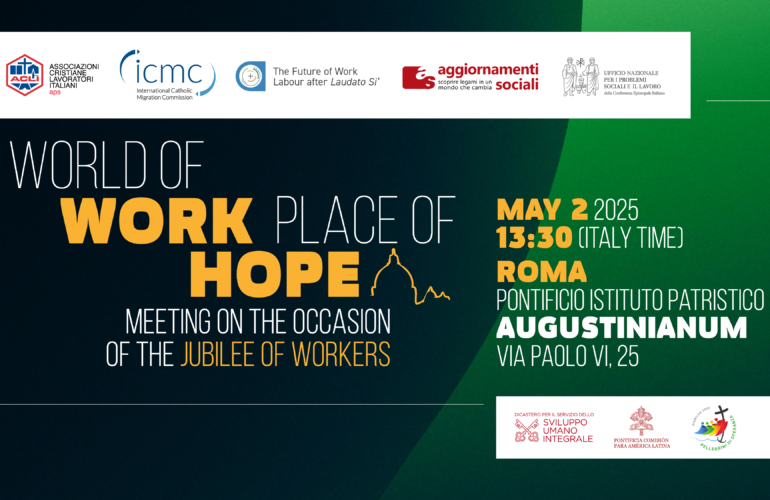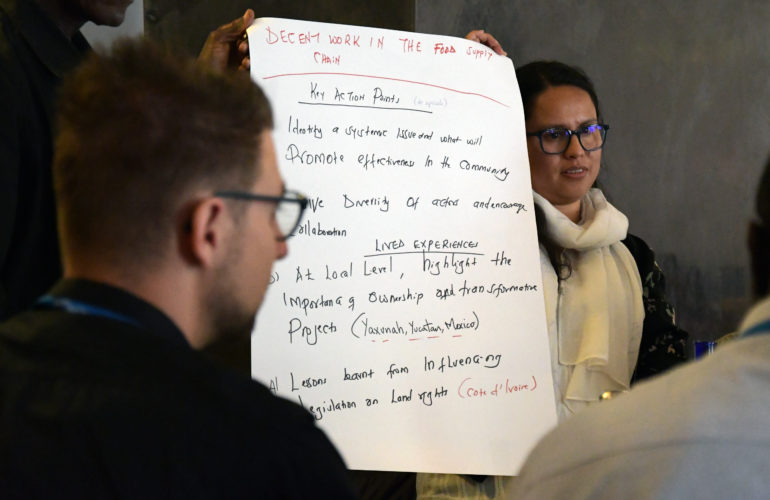‘Obtaining an Identity Document Gives People the Kind of Life They Did Not Have Before’

ICMC interviews H.E. Buti Tlhagale, Archbishop of Johannesburg and spokesperson for the Southern African Catholic Bishops’ Conference, on statelessness, migration, and the role of faith-based organizations
On 15 December 2023, H.E. Buti Tlhagale, Archbishop of Johannesburg and spokesperson of the Southern African Catholic Bishops’ Conference (SACBC), sat down for an interview with ICMC to discuss statelessness, migration, and the role of faith-based organizations in bringing positive change for migrants.
SACBC is ICMC’s member in South Africa, Botswana, and Eswatini. Since 2018, SACBC’s Pastoral Care for Migrants and Refugees has addressed the needs and challenges of refugees and migrants in the Southern Africa region.
His Excellency traveled to Geneva to participate in the United Nations High Commissioner for Refugees’ (UNHCR) Global Refugee Forum 2023, where he took part in the Multi-Religious Council of Leaders meeting.
How does lack of documentation affect the lives of children? What risks do they face?
When children are registered in mainstream education, schools may request parents’ identity documents, but generally do not require such documents for children. School pupils are, however, required to produce identity documents in order to sit their final exams. If pupils cannot take and pass these exams, they cannot progress to university and their futures are blocked.
More broadly, a lack of identity documents prevents participation in many other aspects of life and society, including finding employment, accessing health services, and travelling. Without an official identity people are not registered anywhere and, in administrative terms, do not exist.
What are the main obstacles to registration?
The main obstacle to registration is ignorance. Many people do not believe that obtaining a birth certificate is important, and many others incorrectly believe that a birth certificate can be obtained later in a child’s life. In addition, those in rural areas may have difficulties meeting the cost of travel to the nearest town or city in order to apply for documents. For those whose births were not registered when they were children, the death of their parents leaves them entirely without any way of proving their identity.
The other major obstacle is that faced by children of economic migrants or refugees whose parents crossed the border into the host country without any identity documents. If a child grows up without a birth certificate from the country where he or she was born, the country where they live will not issue one. This is another important impediment to registration.
Are migrants and refugees more at risk of statelessness?
Refugees stand a better chance of being accepted for registration in host countries, because refugees are legally recognized and, in general, a country that accepts refugees has procedures in place to register them.
Economic migrants, or those people who move around looking for jobs, are the ones who are really at risk of statelessness. If a migrant enters a country without identity documents, then it is likely that they will remain undocumented, and therefore stateless, for a very long time. These people remain in limbo, unable to work legally or access mainstream services or facilities such as bank loans. It’s an invidious position, made worse by the lack of legal frameworks to enable people to become citizens. Many governments would rather economic migrants were not in their countries, so they do not adopt laws to enable citizenship in the hope of making it difficult for them to stay.
What is the role of religious leaders in addressing statelessness?
Firstly, religious leaders should seek to influence and appeal to governments to subscribe to the major UN treaties. For children, the UN Convention on the Rights of the Child requires States to register children on their territory whose parents are unknown. This means providing them with a birth certificate so that they can later obtain the official identity documents that will enable them to work, live, and be protected just like any other citizen. The issue is that some governments are not prepared to accept foreign nationals because they already have so many problems in meeting their own citizens’ needs.
Religious leaders can also raise awareness at the community level, in communities where children are born without birth certificates, to raise awareness and try to avoid a situation of lack of registration. The only way to reduce the number of unregistered children in the coming generations is to introduce a law that obliges people to register their children, that is fully implemented and monitored. If religious leaders can help solve the problem at a community level, we are helping both the state and the population.
Do you have an example of a law preventing people from being documented?
[In South Africa], registering the birth of children remains a privilege of men, because only men can provide evidence about the birth and parentage of their children. A child’s parents can only be legally registered as such with a positive DNA test from the father. This discrepancy is caused by a wider problem in the law, which largely considers women to be lesser than men. Religious leaders can campaign to have this specific law on registration changed so as to empower mothers to register their own children, and also effect this change as part of the fight against this broader legal inequality between men and women.
As a member of the Multi-Religious Council of Leaders, can you explain the role faith-based organizations play in addressing migrant and refugee issues?
The government is seldom interested in speaking with or listening to a single church organization. In the South African case, it is clear that the government feels that by simultaneously talking to different religious groups, it means they are talking to a representative group that encompasses the wider society. Collectively we stand more of a chance of being listened to when advocacy is undertaken in a multi-denominational way.
The biggest issue for vulnerable people in South Africa is often not a lack of food or clothing, but laws that do not allow people to become whole persons: to be citizens, and to access all the things that local people can, such as medication, healthcare, legal work, and bank loans to build their own homes. These laws are the things that persecute migrants, and that’s what multi-denominational advocacy must address.
In 2018, the Pastoral Care for Migrants and Refugees was established at the request of the Southern African Bishops’ Conference. Can you tell us a bit more about its activities?
While the Pastoral Care for Migrants and Refugees does carry out charitable work, the most impactful aspect of its activities in this context is research. This work is important because it establishes facts. If we don’t know how many unregistered children or people without documents there are, it is very difficult to make a case for assistance and change. Research with reputable institutions enables us to say how many children are on the streets and in need of accommodation and registration, or are not in education and need access to it.
Another important part of the work is networking for legal assistance to resolve the status of individual migrants, which is the main barrier to people’s ability to meet their basic needs. Referrals to legal representatives working pro bono, many of whom have become specialists in this area due to their experience, are very important to finding solutions. We have also been advocating for migrants to have walk-in access to computer facilities at the organizations that serve them, so they can make online, independent registration applications directly to the authorities.
Can you share examples that illustrate the impact of getting documentation?
One example is of a young girl, who when she arrived to take her high school exams was unable to do so because she had no identity documents. She was 16 or 17 years old, and she had to wait for two years before lawyers could finally obtain identity documents for her. Their achievement in doing so was amazing, and she was able to finally sit the exam, even though her classmates were by then two years into their university studies. She passed the exam and managed to get a bursary to attend university, which was the greatest experience for her. This shows how obtaining an identity document is a miracle. It’s absolutely worth it for organizations to do this kind of work, because it gives life to people – the kind of life they did not have before.
What message would you like to send to world leaders?
Preaching the gospel means addressing the challenges that ordinary people face, and as religious leaders, we are supposed to uplift people’s lives. Registration and obtaining identity documents are material things that change people’s lives and allow them to no longer experience difficulties. As such, that’s where we need to be. We can say this is the work of politicians, but if that’s what you think, then convince them! Religious leaders can do that. We can speak to governments on behalf of the citizens, and amplify the voices of ordinary people who are struggling.
In all countries, there will always be a refugee and migrant minority who fall foul of the laws of the country. Religious leaders should try to influence governments to change laws so people can be accepted in the countries where they find themselves. There is an obligation on religious leaders to do that: if we don’t, we are not addressing the situations of people who have the greatest needs.
Watch the full interview…




